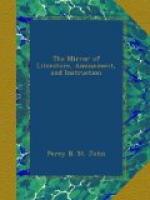In 1821, the newly-erected Royal Opera at Berlin was opened with “Der Freyschuetz.” The effect produced by the first representation of this romantic opera, which we shall never cease to regard as one of the proudest achievements of genius, was almost unprecedented. It was received with general acclamations, and raised his name at once to the first eminence in operatic composition. In January it was played in Dresden, in February at Vienna, and everywhere with the same success.—Weber alone seemed calm and undisturbed amid the general enthusiasm. He pursued his studies quietly, and was already deeply engaged in the composition of a comic opera, “The Three Pintos,” never completed, and had accepted a commission for another of a romantic cast for the Vienna stage. The text was at first to have been furnished by Rellstab, but was ultimately written by Madame de Chezy, and written in so imperfect and impracticable a style, that, with all Rellstab’s alterations never had a musician more to contend with than poor Weber had to do with this old French story. As it is, however, he has caught the spirit of the tale.
“Dance and Provencal song, and vintage mirth”
breathe in his melodies; and although a perplexed plot and want of interest in the scene greatly impaired its theatrical effect, the approbation with which it was notwithstanding received by all judges of music on its first representation in Vienna (10th Oct. 1823) sufficiently attested the triumph of the composer over his difficulties. He was repeatedly called for and received with the loudest acclamations. From Vienna, where he was conducting his Euryanthe, he was summoned to Prague, to superintend the fiftieth representation of his “Freyschuetz.” His tour resembled a triumphal procession; for, on his return to Dresden, he was greeted with a formal public reception in the theatre.
But while increasing in celebrity, and rising still higher, if that were possible, in the estimation of the public, his health was rapidly waning, amidst his anxious and multiplied duties. “Would to God,” says he in a letter written shortly afterwards—“Would to God that I were a tailor, for then I should have a Sunday’s holiday!” Meantime a cough, the herald of consumption, tormented him, and “the slow minings of the hectic fire” within began to manifest themselves more visibly in days and nights of feverish excitement. It was in the midst of this that he accepted the task of composing an opera for Covent Garden Theatre. His fame, which had gradually made its way through the North of Germany (where his Freyschuetz was played in 1823) to England, induced the managers to offer him liberal terms for an opera on the subject of Oberon, the well-known fairy tale on which Wieland has reared his fantastic, but beautiful and touching comic Epos. He received the first act of Planche’s manuscript in December, 1824, and forthwith began his labours, though he seems to have thought that the worthy managers,




